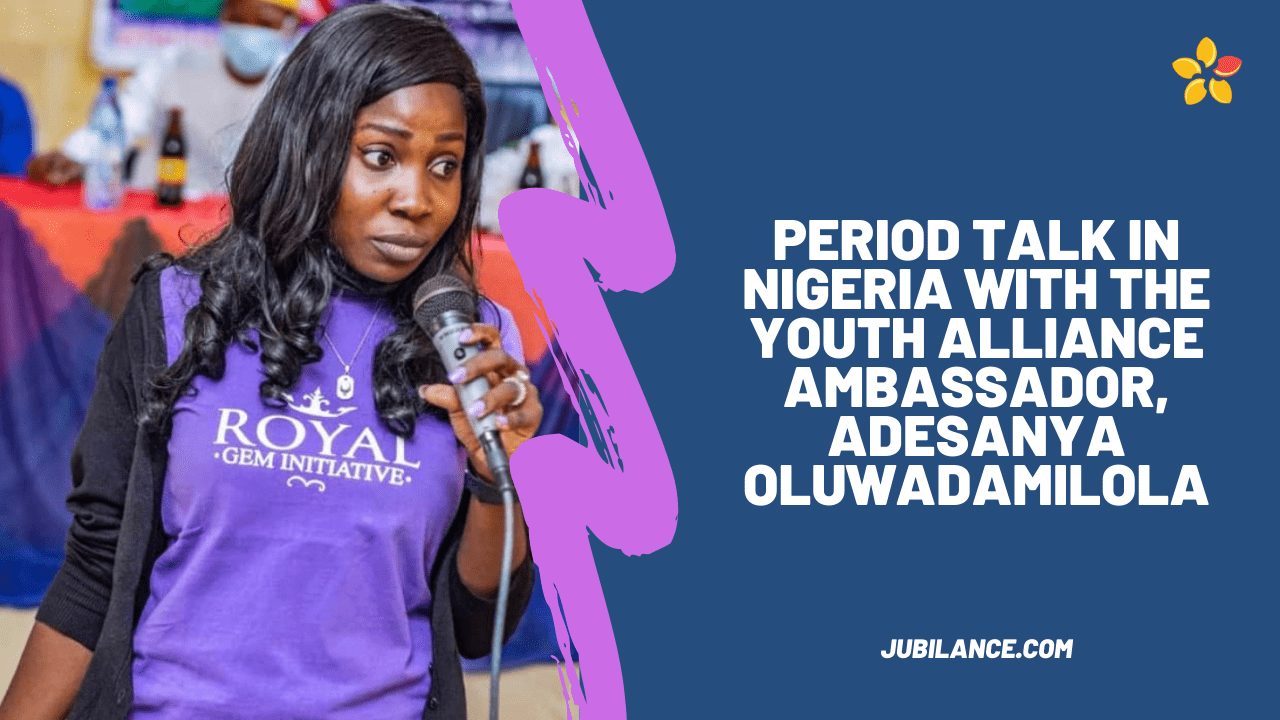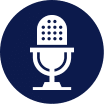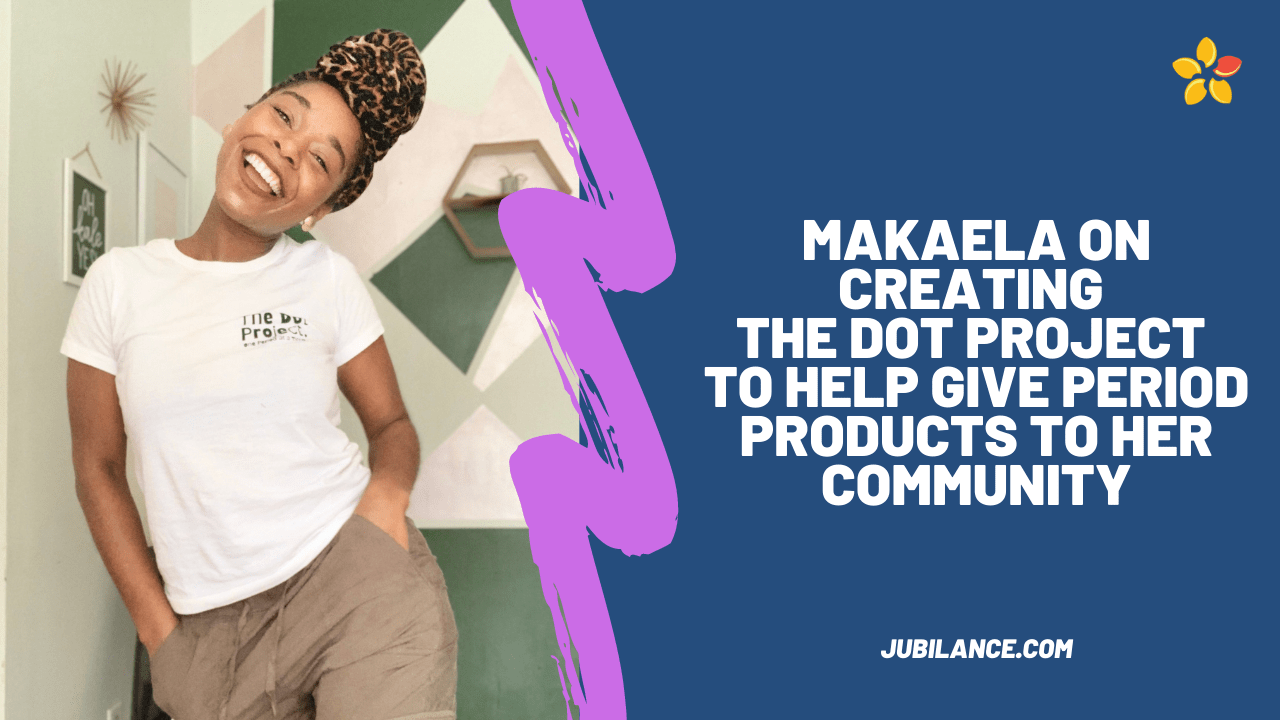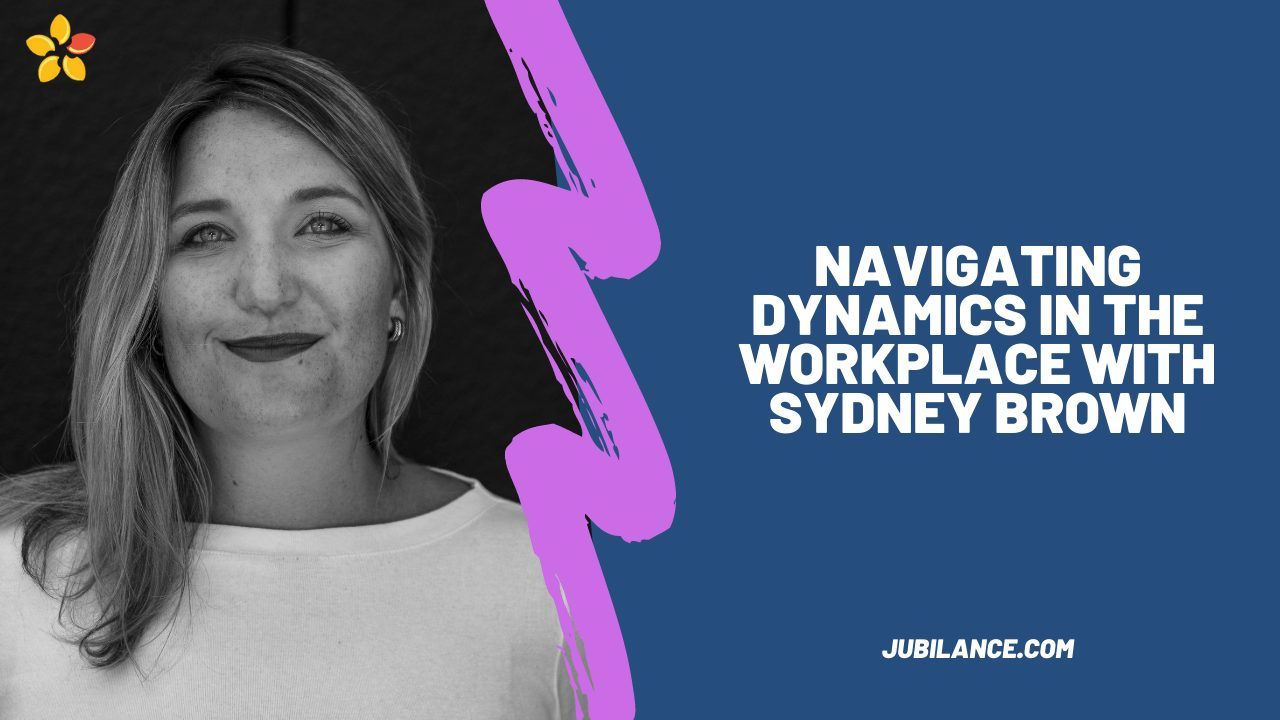What if you didn’t know anything about your period and you thought the blood meant you were dying?
That’s what Adesanya Oluwadamilola thought when she found out she first started menstruating.
Her horror soon turned to anxiety each month when she next reasoned that she must be pregnant even though she’d never been touched by a man, after a struggle battling an eating disorder, Oluwadamilola was able to finally find out the truth, that she was menstruating.
Oluwadamilola vowed in that moment to start helping other girls understand what was happening to them and since, she’s helped 600,000 women as the Youth Alliance Ambassador to Nigeria. Oluwadamilola talks about life in Nigeria and women’s health on the podcast.
Watch her interview now:
Listen to her interview now:
Read her interview now:
Alice: I just want to welcome you to the podcast. Thank you so much for being on.
Adesanya: You’re welcome. Anytime.
Alice: Amazing. Now, can you tell us where you’re calling in from?
Adesanya: Okay, I’m calling from Lagos. Nigeria.
Alice: Amazing. That’s so cool. What’s your favorite part about Nigeria?
Adesanya: The fact that, I just like Nigeria folks. We are energetic, we are consistent, we are surprising and I like the food. Like before, we have varieties of food. We have a whole lot. Like you will hear us with the old Nigeria, Jollof.
Alice: Yes, Jollof is so good.
Adesanya: I wish I could give you some Jollof. Then I met someone some days ago, and he was talking about our pepper soup. Oh! That is heaven on Earth. Pepper soup is amazing. So you should try to get Pepper soup to eat if you have not.
Alice: Okay, I will definitely try some pepper soup; that sounds good. And what is your favorite thing to do outside of work?
Adesanya: Okay, I enjoy baking. I enjoy cooking. I enjoy writing. I do a whole lot of freelance writing, sometimes. Then, Covid period helps me with some. I started watching a whole lot of YouTube videos, I also read, and I did more of food and food pages. Pages that had different kind of foodstuffs. I tried them at home. Baking, any channel that has to do with baking, cooking. Then I love to sing, but I don’t have a good voice.
So if I’m not if I’m not out there volunteering or doing something for the girl child or advocating for something, I would always be at home, either watching cooking food channels. You got singing or bonding with my family. Basically, that’s what I will be doing.
Alice: Oh! That’s nice. And you kind of mentioned a little bit that you’re volunteering. Can you talk about being a youth Alliance Ambassador for your country?
Adesanya: Wow, that’s a lot. Because at first, I didn’t see it coming. You know that point where you’re just into the work and at some point I felt, whatever it was, I was doing, people were not seeing it. I wasn’t getting the visibility. But you know, the thing about doing things because of people, you’re doing it because you want to make a change. You have to be Global impact and about the passion. It was also the passion that was keeping me awake.
So having to wake up one morning and getting this phone call that, whatever it is you’re doing, is being recognized. And Legal State, recognized as one of the people that are doing this and “oh yeah”. Wow, that was great. But I actually thought it was just the… Something ceremonial. I didn’t know it came with more and more work. You know, that point where, you know you don’t want to let people down, and you keep walking. You just know that people out there are looking at you. People are looking up to you.
Then, when people like the advocacy I do that has to do with girl, child, period poverty. So when girls not even realize that there’s one lady up there that is doing all of this. Then your phone starts to buzz morning, afternoon, night. I need this. I need this. I want you to do this. So at first, I thought it was coming with your server and like “whoa”. But it came with a whole lot of work, more and more and more. And to be honest, I would say that helps me because it does help me plan myself better. It has helped me with more consistency.
Then sometimes, I would do always want to just let go of the old things. Probably, sometimes I’m tired. Why am I even doing this thing? And sometimes, even people they are trying to reach out, they will get you frustrated. But now I just know that I can’t stop because I just cannot stop right now. So also being a Legal State Youth Ambassador, SDG Ambassador. It has helped me. Even if at first, I thought it was something somewhere but now, I know that I need to walk and walk and walk and walk. I need to keep digging. I need to keep solving my problems and together the world become a better place.
Alice: Oh, that’s wonderful. And can you tell our listeners kind of like what you’re up to? So you’ve started Royal Gem initiative. What is that? And what are you doing with period poverty?
Adesanya: Okay, so Royal Gem initiative is a non-governmental organization, and it’s centered on SDG sustainable development goal three good health and well-being and for good education. Especially amongst adolescents. So what recently, our Focus has been more on the girl child in the area of mental health and education. Now, most times I will not want to wait for you to ask me how? What Inspired? Whatever it is. I do both.
Alice: Yeah.
Adesanya: Growing up as a very young girl. I used to have a regular menstrual cycle and the only thing I had in my head back then was, once you don’t see your period, you’re pregnant. So if every month I don’t get to see my period, I would cry and cry and cry and feel like I am pregnant even when if I knew I didn’t do anything. I wasn’t having sex. I wasn’t, but I would keep crying. Then sometimes I will be asking myself, “Why did I become the new Mary?” Because I know it was only Mary in the Bible that got pregnant without sexual intercourse. So then the next one that I see the period beginning, and I’m like, “God, thank you for answering my prayers”. I’m really grateful. And now the next month taken, and I don’t see beginning, and I’m like “am I pregnant again?”
Then at some point I said, living in depression, like I wasn’t understanding what was wrong with me. I felt I was different from other girls. At some point I thought I was possessed, and I know that you need to menstruate to become a mother. So many things kept running through my mind. Can’t talk to my mom? Not that my mom is not approachable, but I knew my mom to be this person. She’s going to sit me down and give me five hours lecture. I wasn’t ready for that. So I was always scared, I didn’t want to disappoint my mom. She was doing a whole lot for me, education wise, survival family. So I didn’t do this list of the things. She should be like, “are you now pregnant?”. So I lived with that for years.
So I went to the University. And when I got to University. I studied a health-related course because I felt in school, they’re going to discuss menstruation extensively. But get into school as a physiotherapist, will even have to do anything with menstruation. So I became more confused than frustrated. I wasn’t seeing my period regularly, and I wasn’t allowing boys to touch me. So if back then in my class when boys touch, I would always freak out like “don’t get me pregnant” And I’m still trying to struggle with whatever it is.
What is wrong with me. And then I went into a relationship at some point. With this medical guy thinking, it was going to stop my problem and give me… But I discovered that he only became a very abusive relationship because they’re taking advantage of the fact that I had need to knowledge about these things. At some point is I complain about my weight. I was just weighing 54 kg then. So I struggle with depression, sets of struggle with low self-esteem. And I have Anorexia, I said stabbing myself intentionally because I wanted to lose weight so that I will be the perfect girlfriend for him.
So my academics were becoming really, really bad. I was struggling in class and my grades were dropping, then it was one day. I just said to myself, you can keep suffering this way, and you’re not the only girl going through this. You need to open up. You need to speak up and that day I go home and ask my mom and dad. So they ran some tests on me. The doctor said, it is totally fine. I am normal. Irregular menstrual cycle is normal for people of my age and I started crying that, so I had to. And I started praying that.
So I had to go through all of that for this lead to information that if I’d gotten would have saved me all of that stress. And so, I just felt that I can’t be the only one going through this because when the part of the world in Africa, where women keep quiet about anything that has to do with your sexual reproductive Health. The old taboos, a lot of taboos, a lot of things, flying around, and women always get to talk and most times you just see women dying prematurely from things like they have spoken up about. They would have sat them in walls. I felt that there will be girls out there that are going through this as well. So I decided to start to deal with advocacy for girls, for teenagers, adolescents. See, come out here, you need to talk. I know that they are a whole lot of things going on in your mind.
I know you have a lot going on inside you, but you can’t talk because you’re scared. Don’t worry, I’m here. You can talk to me. I’ve been there, I have medals for this. I have a word for this. I have this. So most times when I talk to girls, and I’m smiling, and I’m like,”Don’t worry, I’ve been there” they are like “really? Here” and then I like “Yeah, give it to me”. Then, when they’re talking about something, you’re also following, you’re telling them the next thing they were expecting. Like “wow, so you’ve been there, you understand better”. Because the info that was read about me in English, ET for me. Yeah, thank you.
Alice: Wow. Oh my gosh, you went through so much. I’m so sorry that you had to go through that with your menstrual cycle. But that’s amazing that you can give that information to other women because we need it for something. It’s still taboo. It’s taboo here in the United States, people just don’t talk about menstrual cycles. So that’s amazing that Royal Gem initiative, and you can open up the conversation for women, And you touched a little bit about it of like how people in Africa. Oh, hello.
I just wanted to say, thank you so much for telling that story. That’s incredible. I’m so sorry you had to go through all of that. And your anorexia. I’m so sorry about that. But it’s amazing that you’re able to give women and girls the knowledge about menstrual cycles, because they really need that. And like you said, it could have saved you so much trouble. And so you are kind of touched by this, about how women see the menstrual cycle in Africa. Can you talk a little bit more about that and specifically, Nigeria? How women talk about their bodies.
Adesanya: Truth be told. People’s, women’s menstruation, reproductive health issues, sexual health issues, body, anatomy, especially in Nigeria are very poor. They see those things as things that should be discussed in private. When I even mean private, I don’t mean private in the four walls of their house. I mean, private, like they feel you should just discuss it with your pillow. Like it should just be between you and God. Don’t talk to anybody, like it is sacred. Like, you don’t need to speak about these things.
There are so many taboos, rules and laws surrounding it that most times young girls are even scared to tell you they are menstruating. So imagine you asking a group of girls. Please, how many people are menstruating here? Who are the menstruators here? You know this person is a menstruating, but they can’t even talk because they’re ashamed of being menstruators. They can’t talk because they are scared that people will look at them like “oh you! you’re menstruating, ew. Really? Are you fine? You’re dirty”.
There’s this attachment to being on pure. There are so many things attached to it, especially in this part of the world. People do not talk about it a lot. Even when you want to help them and you bring up this discussion, you see most parents even taking their children away from the discussion. They feel you want to corrupt the children. So they just take. And you know the funny thing? Especially when it has to do with anything that has to do with sexual education. You see parents, teachers telling you “please it’s enough, don’t talk about it again”. But the next day, you see girls with teenage pregnancy then you wonder how did they get pregnant? And you wonder, was this not the person that the mom said “No, don’t talk to her about sex. She’s still young”. And the next thing, you see her pregnant. And I’m wondering, how did she get pregnant?
We all know Pregnancy is not transferable or communicable. Something had to happen before you got pregnant. So then you wonder. Then most times, these girls don’t even have enough knowledge. They have this knowledge that if a boy touches them, they get pregnant. Then over time, boys keep touching and touching and touching and touching and no pregnancy. Then the boys start taking them for granted.
In short, funnily enough we had an outreach some days ago. A girl came out to talk about menstrual cramps. And she was like, someone told her that the solution to menstrual cramps was regular sex, frequent sex. And she was like “Amazingly, it works”. And I was like “It worked. How did you know it worked?”. And she said, because for some days or for some months now she discovered that her period is not coming. We had to run a test on her to find out that she was pregnant. She didn’t even know she was pregnant.
Alice: Wow.
Adesanya: She felt that regular sex was the solution to the menstrual cramps she was having, not even knowing that. So the lack of information she had kept her into all of that. So that poor or wrong information she had. If she had gotten a very good info or if she had gotten the right information prior to that, she will know that sex has nothing to do with menstrual cramps. She will know that there are other ways to deal with these things. But you the fact that they don’t get to speak up. Even when you want to talk to their parents or their moms about these things, they shy away from it and they run away. They don’t talk to them. So they go outside, they ask the opposite sex. And those want to take advantage of them and give them wrong information just to suit whatever it is they want to do.
Alice: Wow. That’s terrible.
Adesanya: So our knowledge about sexual education here. I will say is kind of poor, really poor. And that’s why we keep advocating [inaudible]. That’s why we keep going out of our way to talk to [inaudible] and women. Recently, we saw that we can’t do these things for girls without their mom. How much information do the mothers even have? Their mothers don’t even have a lot of information. So [inaudible] give. You can’t give from an empty bottle. You can’t pour from something that’s empty. So if you don’t have anything, what do you want to give your children?
So your children come to you, “Mom, this and this and this” and you’re looking, “I think, it’s not for this age, just wait”. And you know the thing about it is. This generation is really different from the generation, previous ones. These ones are really learning very fast. The internet is really accessible to them. So they open or they check the internet and they see this wrong information and they pick everything hook, line and sinker. They don’t process it. So I will say for now, knowledge and response about sexual health, body anatomy, menstruation, in this part of the world is still informers kind of poor. Yes, people now know more about it. But they don’t even have the right knowledge, the right information about it. So we’re doing our part, and we keep working.
Alice: That’s amazing. I didn’t know any of that. And just like how inaccessible knowledge about menstruation is. It’s amazing what you’re able to do then. So what are you doing exactly with the Royal Gem Initiative? Are you going into schools? Are you talking to mothers like you said? What are you guys up to get that knowledge out there?
Adesanya: Okay. So at first, we actually thought the problem was only period poverty. So we started going from schools to schools, rural communities to distribute sanitary pads. Free sanitary supplies, sanitary pads, underwear and soaps for girls in underserved communities and schools. We started with that. But over time, we discovered that we’re just distributing. These girls don’t even have the basic knowledge about what we are distributing. So they see it as just sanitary pads. There’s no hygiene on it.
So because we’ve given them sanitary pads and they cannot afford to buy it. They decided to make sanitary pads that should last for a month. They keep making it so it can last them for as long as three months. Then over time, you start to hear about so many infections and blah-blah-blah. So we had to sit them down again and start the hygiene part of it, the hygiene practice. So if we’re giving you sanitary pads for a month, please try and make sure you’re using it for a month. If you need more, reach out to us and we’ll get to you.
Then over time, we discovered that it became more than even menstrual hygiene practice. We discovered that there was even the part of sex education. There was the part of self-esteem. So most of them have lost their self-esteem in the process of not having the right sanitary products or materials to use. So imagine someone using probably cotton wool, foam, cloth material or rag, coming to school and it’s always getting stained regularly. So, she’s already ashamed of herself. Friends are already abusing her that you’re from a poor family. They can’t even afford to give you this. So she can’t even stand up.
Overtime, it started affecting them academically. Most times, they don’t come to school when they’re on their periods. Even when they come to school, they don’t function well in school because while they are in class they are thinking of how to get the next menstrual supply for the next month. They are thinking of how to go to the toilet to change what they feel is already stained. So they can’t even talk. Over time, low self-esteem builds in.
Then over time, we discovered that they don’t even have adequate knowledge about their body. So imagine a girl, the only thing she knows about her body is just the breast and the “bom-bom”. She doesn’t even know that there’s an ovary, there’s a fallopian tube. She doesn’t even know that there’s a uterus. She doesn’t even know the difference between the vagina and vulva. She doesn’t even know anything. So we discovered that it was way beyond period poverty. There was a part of the body anatomy. There was a part of self-esteem, There was a part of self-confidence. So many issues.
Even so many of them have been sexually harassed because of these things. When they have to go and meet uncles or the opposite sex for money. And those take advantage of them. Or a man advising a girl that, “You better get pregnant. Pregnancy will save you the stress of menstruation” . And she sits down and thinks about it, “That’s true. Nine months”. Not knowing that pregnancy on its own is huge. That’s a whole lot. So they start to become mothers at early ages. They go into what they’re not supposed to and it becomes really frustrating.
So Royal Gem is way beyond period poverty. We started with period poverty but over time we discovered that the problem kept getting bigger. We started having more problems before us. And we had to solve all of those problems. So the more problems we get before us, the more problems we solve. The more we go, the more problems we see and the more problems we solve. So whatever it is that has to do with women’s sexual health and reproductive health, we always try our best to solve it in our own way.
Alice: Wow. That’s amazing. It sounds like you do have a lot to do. And like you said with the Youth Alliance ambassador, it just keeps going.
Adesanya: Exactly.
Alice: Incredible. And something that we always ask on this podcast is what is your definition of womanhood?
Adesanya: Okay. I know that so many people have their own definition of womanhood. But for me, being a woman is… I don’t know how to explain it. But over time I started saying this to myself, and being a woman means being unapologetic. And the only way I can do that is by sharing my ideas, pushing boundaries, finding my own voice, and I can prove that. Yes, I know gender is also part of our identity but gender should not restrict me to cultural boundaries of how a woman is supposed to be.
Yeah, in this part of the world or in Nigeria. There are definitions for how a woman should be, how a woman should live, how a woman should even sleep, and how a woman should dress. There’s a whole lot. It can be really overwhelming being a woman in this part of the world. But over time, I’ve come to discover that I should not allow that to limit me. I should not allow that to define me. I should not allow that to even make me voiceless. We are unique. Women are unique. And that is the beauty of being a woman. Yes, it comes with its own baggage. It comes with its own ups and downs. But being a woman is really unique.
Having all of these thoughts at the back of my mind has really helped me live past the expectations that people expect of women. So really, I wouldn’t say because I want to live with the expectations that people have about being a woman and I should be silenced. Now, if I didn’t come up to do all of these things or if I feel that because people believe.
I explained something. We’re in this part of the world where women see talking about these issues as, “mm-mm, it’s not good to talk about it in public”. So if I kept quiet, do you know the number of people that would have suffered? Over time, I think I’ve reached out to over 100,000 girls.
Alice: Wow.
Adesanya: Sometimes I sit down and think about all of this. So if I had kept quiet, does that mean those 100,000 girls would have to suffer? Does that mean those 100,000 women or people. Do you understand? Will have to suffer.
So I see being a woman it can be overwhelming, overbearing, and overtaxing but I see being a woman as you being unapologetic about whatever it is you decide to do. You need to open up, you need to speak up, you need to have a voice. And everybody has been designed to have a voice. So you look for your own voice and speak up. Let it be heard. Shout if you need to shout. You don’t need to whisper, you don’t need anybody’s permission to speak. You need to speak up and let people know that, “yes, you’re a solution to problems that are on the ground”.
Alice: Oh my gosh, that’s amazing Demi. 100,000 women? That’s incredible. That’s incredible. Wow. You do need to speak up and shout out. A 100,000 women.
Adesanya: Before, I was usually scared. That oh, wow, what I want to really venture into, how would people feel? Like really, you? What do you want to talk about? What do you have to talk about? Funny enough if you see me, I have this very small stature. So it’s easy for people to push me back like you, what do you have to say? But I discovered that at first I was whispering. I was whispering and people at the back were not listening. They were not hearing it. And most of the people I needed to reach out to be were those at the back there. They were not getting the message. They were not getting the information. But the moment I started shouting, when I started screaming, those that needed it started getting it. They started talking. Girls started opening up, whatever it is that was wrong with them. People started speaking up. I have this problem. I have this health challenge. I have this issue. I need help.
Nobody is above help. We all need help at some point in our lives. Nobody is an island. You need people’s help to function. We need people around us to be stable. So I just thought about it. If you keep being voiceless, if you keep whispering, nobody will hear and people that need your help will not get it. And since then I say sometimes women scream, let them hear you. Shout.
Alice: Amazing, incredible. And where do you see Royal Gem Initiative going in the future?
Adesanya: I see Royal Gem Initiative as a global organization, providing menstrual health solutions to young girls, to women in Africa and internationally. I see Royal Gem in a very big place. I see Royal Gem really solving problems that has to do with sexual and reproductive health. At some point not even for women alone, even for men because even men have issues. But because they’ve been built to be these strong and emotionless people, which is very false. They are more emotional. Well, because society has built them or trained them to be strong and without emotions. But they have more issues. So I see Royal Gem as a global organization providing solutions to problems that has to do with reproductive and sexual health, internationally. That’s why I say Royal Gem.
Alice: Amazing, Demi. And how can people find out? How can our listeners find out more about your organization and view?
Adesanya: Okay. We’re on Instagram and our handle Instagram is Royal Gem Initiative. We’re on Facebook. Our handle on Facebook is also Royal Gem Initiative. We have issues with our Twitter accounts because of what happened recently with Twitter. So we have issues with our Twitter. And then at the moment, we are working on our website where we intend to put more information, like a whole lot of information. So at the moment, that’s what we’re busy with. We want to make it really interesting and packed for our viewers and for people that have been supporting us because we really cannot deny the fact that we’ve gotten a whole lot of support from people. We have got massive support, massive feedback. As in, people have been really amazing.
Sometimes you just wonder like, this just started with a little idea with a dream, the way people turn up and turn out for us has been so amazing. So we’re working on our website for people so they can have better knowledge about what we do. So for now, everybody should just check us out on Instagram, on Facebook. Very soon, we’ll bring out the website.
Alice: Yeah. Incredible. And thank you so much for being on the podcast today, Demi. It was amazing to get to talk to you and hear the incredible things that you’re doing.
Adesanya: Yeah. Thank you. I’ve been looking forward to this day. I’ve been looking forward to meeting you, to seeing you, to speaking with you. I’m so happy. Thank you for having me.
Alice: Yeah. I’m so happy we could connect.
Adesanya: And thank you to your audience. You’re doing a very amazing job. Very, very amazing. Then I know you work with some supplements. You do some supplement for PMS. You’re doing really amazing.








